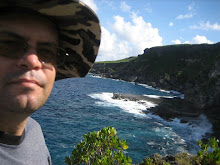“Try the Air Force plane, they fly in bad weather," I heard from many different people as I waited for the next weather report.
This idea intrigued me. I never would have guessed that the Air Force would fly passengers to the interior of New Guinea, but in Indonesia, anything is possible. I got directions to the Air Force. Luckily it was at the same airport. Even though it was a small airport I had to keep getting directions. I couldn’t see the Air Force planes anywhere. “Where is the Air Force?” Everyone kept pointing at the small building by the runway which had a sign that clearly read, “Air Fast”. It was a cargo transportation business.
I guess I was a little disappointed that I wasn’t going to fly an F-16 to the Irian Jaya interior, but a cargo plane would do.
All of the seats were removed from the plane except for the last row. In their place were perhaps fifty 50-gallon drums full of gasoline. The drums were on their sides and tied to the floor. The smell of gasoline made me dizzy and I still hadn’t reached my seat at the back of the plane. I knew it was going to be an interesting flight.
The passengers included myself and three Indonesian men. Typically, all Indonesian men would light their cigarettes as soon as the no smoking light was turned off. This plane had no light and I hoped they had enough common sense to keep us alive. When the plane started its take-off a wave of gasoline an inch high washed to the back of the plane and drenched our shoes.




Another surprising sales item were very old Dutch coins. These coins would have made it to the highlands the same way the shells did. I learned that many of the people at this market walked for days from their village in the mountains just to sell their chicken or shell necklace or antique coin. They would then buy something else and return to their village.
The hotel was the kind you would expect for a third-world country but that was much better than I was expecting for such a remote area in a third-world country. There were many hotel employees and I was the only guest so we had lots of time to talk. One offered his services as a walking tour guide to visit some very remote villages.
"And what shall I do with my duffle bag?"
That question was quickly answered by another hotel employee, "I'll carry it."
The price they offered for their services left no room for negotiation. For the multi-day hike through the mountains, the guide wanted $15. And the poor guy who was going to carry my 100-pound duffle bag everywhere we went, wanted $5. The tour was going to cost less than if I was to spend another night in the hotel. We left at sunrise.
Look closely. This is a picture of me and my porter. My guide was my camera man.

We decided to cross, but very slowly and tightly holding hands. The theory was that if one of us fell through the other could hold on and pull him back up. The height was scary enough but seeing the raging river through the missing floor planks made the crossing ridiculous. We could hear some of the remaining floorboards cracking as we crossed. It took some time but we got to the other side.
We sat on the edge of the cliff watching the bridge that we just conquered. At that point I wasn't sure if we were brave or just stupid. As we sat, another person came along to cross the bridge. He was moving rather quickly over the bridge, apparently having crossed many times before. Half way across there was a gust of wind that made the bridge sway. We watched in terror when the man stumbled and fell to the floorboards but quickly got back to his feet and continued. After he safely reached the other side we looked at each other and laughed. A different route was planned for our return trip to the hotel.
We stopped at several remote villages along the way. For a couple of dollars the village fed us and gave us a hut to spend the night. The people were very friendly and tried hard to please us. They had a difficult but peaceful life. They spent all day at their farms and gathering firewood for that night. Even though we were close to the equator, it still got cold at night. The round huts had a fire pit in the center but no chimney to let the smoke out. The smoke would seep out through the grass roof which made it difficult to breath while sleeping.



I paid my guide and porter and thanked them for a wonderful adventure. I wanted to talk more but they were in a hurry to get their fair share of the furniture.


After a long 5 hour hiking stretch with seeing no signs of people we came along side this village. I was anxious to stop and rest but the porter refused. He never said why. I guess that he probably backed out of a marraige proposal from someone in this village.
I guessed this family had a coffee bean farm and the kids showed the signs.

All the trails led straight up the steapest part of the mountains. No winding, no going around, just straight up one side and straight down the other. It reminded me of Marine Corps bootcamp.
The smoke from a farm a few miles away was considered to be from the gods because no one ever ventured that far from the village. The funny thing is that the farmers from that fire thought our fire was also from the gods.

Read more of "My Adventures" on the top right of this page.




No comments:
Post a Comment